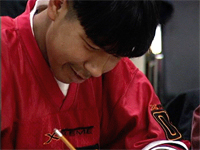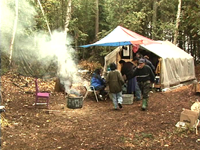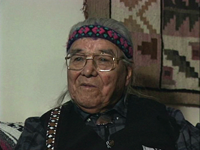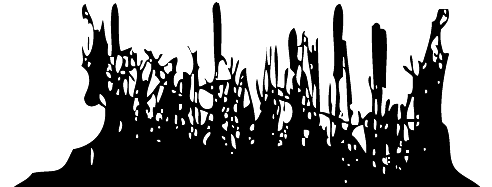Français
Finding Our Talk Season One
- Episode 1: Language Among the Skywalkers: Mohawk
- Episode 2: Language Immersion: Cree
- Episode 3: The Trees are Talking: Algonquin
- Episode 4: The Power of Words: Inuktitut
- Episode 5: Words Travel On Air: Attikamekw/Innu
- Episode 6: Language in the City: Ojibway/Anishinabe
- Episode 7: Getting Into Michif: Michif
- Episode 8 : Plains Talk: Saulteaux
- Episode 9: Breaking New Ground: Mi'kmaw
- Episode 10: A Silent Language: Huron/Wendat
- Episode 11: The Power of One: Innu
- Episode 12: Syllabics: Capturing Language: Cree
- Episode 13: A Remarkable Legacy: Saanich
Finding Our Talk Season Two
Finding Our Talk Season Three
Episode 3: The Trees Are Talking - Algonquin
This episode, filmed in the community and surrounding lands of Lac Simon, Québec, home to some 1,200 Algonquin people, contrasts a situation in which language is transmitted through family, from generation to generation, with modern educational methods involving classroom and extracurricular activities.
Background
 The Algonquin language is part of the Algonquian family of First Nations languages, the largest in Canada, encompassing some 10 distinct languages and 130,000 speakers. There are 10 Algonquin communities located within a large territory in southwestern Québec. Until the mid-50's, all schooling was of the traditional kind - children learned the stories, songs and skills of their culture. Language was passed on orally for the most part and the land-based way of life made the acquisition of reading and writing skills unnecessary.
The Algonquin language is part of the Algonquian family of First Nations languages, the largest in Canada, encompassing some 10 distinct languages and 130,000 speakers. There are 10 Algonquin communities located within a large territory in southwestern Québec. Until the mid-50's, all schooling was of the traditional kind - children learned the stories, songs and skills of their culture. Language was passed on orally for the most part and the land-based way of life made the acquisition of reading and writing skills unnecessary.
In the early part of the century, an order of religious teachers from the nearby Quebecois town of Amos founded a residential school for the "instruction and civilizing" of Native children. For decades, children from all the surrounding native communities, Algonquin as well as Cree and Montagnais, were brought to the school to learn "white man's subjects", including the language. Thus began the systematic erosion of Algonquin as a first language, its relegation to something folkloric and broken, spoken fluently only by the elders.
Though the residential school is gone, the Algonquin language faces an uphill struggle. Recognition of the critical state of the Algonquin language has spurred efforts to make native language acquisition part of the core curriculum for all students. Lac Simon has both primary and secondary schools, established in 1982 and 1999 respectively. Until grade 1, children receive their education entirely in Algonquin. From grade 2 through high school, Algonquin is taught one hour per day.
 Part 1
Part 1
Richard Pacquet is a Francophone who teaches high school in Lac Simon. We join him and his class of teenage students, accompanied by their Algonquin guide, George Wabanonick, at an isolated campsite where they spend several days participating in land-based activities and language learning. Later in this part of the episode, we drop in at the school where students also learn the Algonquin language in a more formal classroom setting. We witness the way Algonquin is taught following conventional educational standards of grammar, reading and writing and using modern curricular methods.
Differences between these two methods of learning offer a striking lesson in the major barriers to First Nations language fluency. Young Algonquins learn French effortlessly, through television, video games, advertising and the many influences that come from living in a predominantly French society. First language acquisition and retention must take place and be continually reinforced within the familial environment, especially once the immersion phase of school learning ends. Without that family-based reinforcement, language slowly degrades and can ultimately be lost completely.
However, the reality of life in this First Nations community is that most people now live in the village of Lac Simon. They no longer survive nomadically, in isolated, temporary camps. And along with settlement come the institutions that serve the needs of people now living in larger permanent communities.
 Part 2
Part 2
The residential schools posed a definite threat to the Algonquin language, which began to decline in the 50s and 60s. Bands now control their own schools, which provide regular instruction in Algonquin, yet Lac Simon students speak mostly French at home with parents and friends. Added resources are needed to reinforce language instruction in the schools.
But the roots of Native language are not in the classroom. A thriving language needs stories, music and poetry. Alex Cheezo is a musician and social worker from Lac Simon. He knows the importance of Native culture and language in forging a sense of identity for the younger generation. Alex is a founding member of the group "Anishnabe", an Algonquin word meaning "people of the land".
 Language Keeper
Language Keeper
William Commanda is an important Algonquin First Nations leader who has made his mark internationally. He believes language is a key to spirituality. What it says in my language, ‘’Annishnabe’’, it means the people, the men. ‘’Nabe’’ means men. Like when we say ‘’kwe pekan’’, kwe means hello. You know, that maybe you've heard that. Pekan means stranger, so that's Quebecois. Cartier was told that when he arrived, by the Algonquian. He was told ‘’Kwe Pekan’’, hello stranger.

